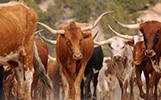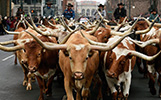| Livestock – Opportunity and Threat for a Sustainable Latin America
Orlando Milesi, Inter Press Service | September 4, 2016
Stockbreeding generates enormous profits in Latin America, but it also has a broad and varied impact on the environment, which means it must urgently be turned into a sustainable, green–friendly, socially accepted and profitable activity.
"The expansion of livestock production in the countries of Latin America represents both an opportunity and a threat for sustainable development in the region," FAO animal health officer Deyanira Barrero told IPS.
"On one hand, it's an opportunity to generate wealth and mitigate poverty, if good political and policy decisions are made and sustainable, environmentally–friendly livestock production systems are promoted. On the other, it's a threat if the activity continues to expand without taking into consideration the environmental costs and the potential effects in terms of the marginalisation of small–scale producers," she said.
Meat & Livestock Australia Pumps Cash into Feed
Oscar Rousseau, Global Meat News | September 6, 2016
Meat & Livestock Australia (MLA), the country's red meat levy board, will invest $12.7m to bolster the competitiveness of feedlot operators via an innovation and marketing push. The levy board will invest more than it did last year in grain–fed beef verticals, with total investment rising by around AU$100,000 compared to last year.
"For feedlot operators to remain competitive and sustainable in the long–term, MLA's research, development and adoption programs need to deliver outcomes that improve their bottom line," said Des Rinehart, MLA's grain–fed, live export and goat program manager.
Rinehart described investment in R&D as "vital" to ensure the intrinsically–linked productivity and profitability of the beef industry in Australia is strengthened.
Protecting Disappearing Livestock Breeds 
Food Tank | September 7, 2016
According to the U.N. Food and Agricultural Organization (FAO), close to 17 percent of the world's livestock breeds face extinction. Many of these livestock breeds are indigenous, adapted to local conditions with long agricultural and pastoral traditions. Africa alone is home to more than 150 cataloged breeds of cattle.
Poor farmers often raise indigenous breeds, managing herds both to maintain diversity and to support community livelihoods. This direct human involvement in cultivating agricultural biodiversity is "inherently linked to sustainable use," according to the Convention on Biological Diversity.
Fertility in Focus as Cattle Herd Rebuilds
Queensland Country Life | September 7, 2016
Where growth and carcase traits have long dominated selection pressure for beef producers looking to increase kilograms per hectare, herd rebuilding has shifted the focus to total profitability and the role fertility plays in that.
Research into the contribution of puberty in heifers to herd reproductive performance has been making solid strides, with imaging technology paving the way for new approaches.
Listening to Consumers to Maintain Agriculture's Social Licence
The Sheep Site | September 15, 2016
"In the past conversations about agriculture were happening without us," said Trish Jordan, Monsanto Canada's head of Public and Industry Affairs, during a presentation at the Canadian Beef Industry Conference in Calgary on August 10th.
"When you aren't engaged in the conversation, others step in and have that conversation for you. Over the last few years we have tried to remedy that situation. We've engaged in many conversations, generated a lot of online content, and shared the positive stories of not only what we feel we are contributing to the industry, but what you are doing as farmers."
China Will Resume Limited Imports of US Beef After a Ban Long Seen as Political 
Time | September 23, 2016
For 13 years, people living in China couldn't savor an American steak. But new regulations announced on Thursday mean that some American beef is welcome back in China, reversing a ban instituted after an outbreak of mad–cow disease in the U.S. in 2003.
Chinese officials will still limit U.S. beef imports, only allowing in cattle younger than 30 months. Exactly how American cattle traders will contend with Chinese quarantine requirements is not yet clear. But for an American industry that relies increasingly on global demand, especially amid a declining taste for beef at home, the China news is welcome. (Chinese restrictions on Canadian beef are also being lifted.)
"The United States produces the highest–quality beef in the world," said U.S. Secretary of Agriculture Tom Vilsack in a statement, "and China's 1.3 billion consumers are an important market for U.S. producers." | |
